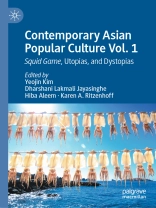This first of two volumes explores how contemporary Asian popular culture reflects and critiques social issues. The authors, from different scholarly backgrounds, examine how shows like Squid Game present a scathing critique of oppressive socio-economic structures, conceptualize national heterotopias, utopias, and dystopias, and facilitate understanding of identity formation and discourses of resistance. The volume encompasses chapters discussing themes that intersect gender, race, politics, and social dynamics. It showcases ongoing developments in Asian popular culture in the wake of the global popularity of Squid Game and in anticipation of its second season release in December 2024.
Inhaltsverzeichnis
Chapter 1: Introduction.- Part I: Sociopolitical Narratives and Critique.- Chapter 2: Diegetic Violence as Narrative Necessity in Squid Game.- Chapter 3: Precarity and the Gladiators of Contemporary Television.- Part II: Discourses and Identities.- Chapter 4: Time, love, and memories in Dystopian Hong Kong: How Wong Kar-wai’s 2046 sheds light on protestors’ affects in anti-extradition bill protests.- Chapter 5: Connecting the Past to the Present: Independent Short Documentary, Camellia Flowers.- Chapter 6: Let’s team up! Constructing narrative through alliances in Squid Game.- Part III: Class, Labor, and Environmental Perspectives.- Chapter 7: Anthony Shim’s Riceboy Sleeps (2022): Metaphors of Survival in the Korean Diasporic Experience.- Chapter 8: Exploitation and Violence: Precarious Labor in Squid Game.- Chapter 9: Navigating Labor and Environmental Justice with Eiichiro Oda’s One Piece.- Part IV: History, Nation, and Ideology.- Chapter 10: Rome as dystopia and Japan as utopia in Thermae Romae (2012) and Netflix anime series Thermae Romae Novae (2022).- Chapter 11: Victims, Villains, Spies, and Sluts: Gendered Nationalism and the Politics of Desire in Bollywood Films.- Chapter 12: Squid Game as Reflexive Heterotopia: From Text to Context.
Über den Autor
Yeojin Kim, Ph.D. is an associate professor in Communication at Central Connecticut State University, USA. She is also affiliated with the East Asian Studies and Asian American and Pacific Islander Studies. Her primary research area is digital media and strategic communication, focusing on how organizations and the public communicate in a digital media environment, employing various messages and channels to achieve specific strategic goals.
Dharshani Lakmali Jayasinghe, Ph.D. is an assistant professor of Anglophone and World Literatures in the Department of English at Central Connecticut State University, USA. With a background in comparative literature, Jayasinghe’s interdisciplinary and cross-cultural research and teaching interests include themes in immigration, visa law and policy, LGBTQIA+ identity, Global South epistemologies, and translation studies in anglophone and world literatures and film.
Hiba Aleem, Ph.D. is an adjunct faculty member in the Department of English, Writing, and Communication at Emmanuel College Boston, USA, where she teaches Literary Methods and has taught Global Literature and Film and Academic Writing. She is also a Fulbright program scholar from Washington College, Chestertown, holds a Ph. D in English from JNU, New Delhi, and has more than six years of experience teaching undergraduate and graduate courses in English literature, language, and writing.
Karen A. Ritzenhoff, Ph.D. is a professor in Communication and Women, Gender, and Sexuality Studies at Central Connecticut State University, USA. In 2021 she co-edited Mediated Terrorism in the 21st Century (Palgrave) with Elena Caoduro and Karen Randell. New Perspectives on the War Film was published by Palgrave in 2019, co-edited with Clémentine Tholas and Janis L. Goldie. Ritzenhoff has published three additional anthologies with Palgrave.












